Reishi's Unique Sleep Mechanism
- Categories:Media Center
- Time of issue:2024-03-28 15:11
- Views:
Reishi's Unique Sleep Mechanism
- Categories:Media Center
- Time of issue:2024-03-28 15:11
- Views:
Today is World Sleep Day on March 21, and the call to "sleep well" has become a hot topic again.
How can we achieve healthy sleep? Huang Zhili, Chairman of the Chinese Sleep Research Society, proposes three essential conditions:
1. Good Timing for Sleep: Ideally, go to bed at 10:00 PM.
2. Appropriate Sleep Duration: For adults, 7 to 8 hours of nighttime sleep is suitable. Even if you wake up occasionally, you should be able to fall back asleep quickly.
3. High Sleep Quality: Upon waking up, you should feel refreshed, clear-headed, and energized.
The improvement of sleep by Ganoderma (Reishi) is closely related to these essential conditions. Whether it’s extending sleep duration or enhancing sleep quality, Reishi provides benefits. Additionally, Reishi’s advantage lies not only in its impact on the nervous system but also in its involvement with the immune system, which is its unique strength.
Today, we share an in-depth article by Taiwanese author Wu Tingyao, exploring how Reishi truly improves sleep. How does it differ from typical sleep aids? Let’s delve into it, and we hope you find it enlightening.
The Sleep-Enhancing Effects of the "Ganoderma lucidum + Ganoderma sinense" Compound Preparation
Through accumulated practical experience, we know that improving sleep with Reishi requires patience, confidence, and sometimes increasing the dosage. Animal experiments also help us understand which Reishi preparations may be effective and why.
In 2011, a research report jointly published in the journal "Strait Pharmaceutical Journal" by the National Edible Fungi Technology R&D Sub-Center and the Fujian Provincial Center for Disease Control and Prevention serves as a classic example of evaluating the efficacy of Ganoderma preparations in improving sleep function using a commonly used animal model for sleep research (such as pentobarbital-induced sleep experiments in mice) from a scientific perspective.
The research utilized a compound Reishi preparation composed of specific proportions of "Ganoderma lucidum extract + Sporoderm-broken spore powder of Ganoderma lucidum + Ultrafine Ganoderma sinense powder." Both Ganoderma lucidum and Ganoderma sinense are officially recognized medicinal Reishi species listed in the Chinese Pharmacopoeia. Although individual efficacy in aiding sleep had been demonstrated in early clinical applications, the combined effect of these two Reishi species was discussed only in this study.
According to the testing method for improving sleep function introduced in the "Technical Specifications for Inspection and Evaluation of Health Foods" (2003 edition) at that time, the research team set low, medium, and high doses (160, 330, 1000 mg/kg) by five times, ten times, and thirty times the recommended dosage of "Ganoderma lucidum + Ganoderma sinense" compound Ganoderma preparation (2.0 g per day for every 60 kg of body weight), and continuously fed mice with these three doses for 30 days, then induced sleep in mice with pentobarbital sodium (sedative-hypnotic drug).
The results indicate that, compared to the control group that did not consume Ganoderma, the group receiving medium and high doses of the compound Ganoderma preparation exhibited significantly shorter sleep onset latency and substantially extended total sleep time (as shown in the following graph). Based on the criteria outlined in the "Technical Specifications for Inspection and Evaluation of Health Foods" (2003 edition), it was determined that this compound Ganoderma preparation has a beneficial effect on improving sleep.
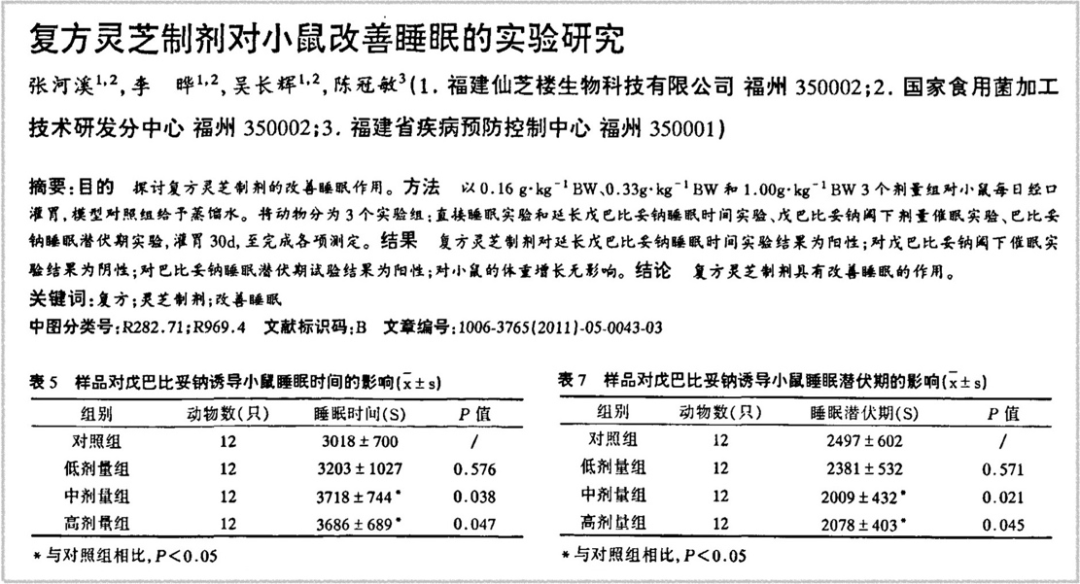

Ganoderma exerts a "strengthening and consolidating" effect on the nervous system, making it possible to achieve better sleep.
Why does Ganoderma help improve sleep? Professors Cong Zheng and Lin Zhibin from the Department of Pharmacology at Peking University School of Basic Medicine jointly published The Pharmacological Study of Lingzhi (Ganoderma Lucidum) And The Research Of Therapeutic Principle of "Fuzheng Guben" in Traditional Chinese Medicine in the Journal of Beijing Medical University in 1981, pointing out that patients with insomnia have a particularly sensitive (unstable) nervous system. Even mild stimuli or disturbances can significantly impact them. Therefore, Ganoderma can improve patients’ sleep and related mental symptoms, indicating its role in safeguarding (stabilizing) the nervous system. This aligns with the principles of traditional Chinese medicine, specifically the concept of "strengthening the body’s resistance and consolidating the constitution".
The therapeutic principle derived from clinical efficacy has also been confirmed in animal experiments. These experiments demonstrate that Ganoderma can reduce spontaneous activity in animals, enhance the sedative and sleep-inducing effects of barbiturates, and attenuate responses to painful stimuli. Furthermore, at high doses, Ganoderma prevents experimental animals from experiencing convulsions when subjected to electric shocks. These results collectively indicate the following:
Ganoderma reduces the central nervous system’s responsiveness to external stimuli, thereby promoting sleep and ensuring adequate rest for brain cells. It facilitates the normal functioning of metabolic processes, including assimilation (synthesis) – the process of recombining digested nutrients for bodily use and storage.
Furthermore, when the nervous system is subjected to pessimal stimulation (pathological stress), Ganoderma can also exert a protective effect, preventing central nervous system overexcitation and functional disruption, thereby ensuring accurate and effective regulation of the central nervous system on the autonomic nervous system and visceral functions, and enhancing the organism's ability to maintain homeostasis. With the improvement in the organism's ability to maintain homeostasis, sleep quality and overall health naturally improve accordingly.
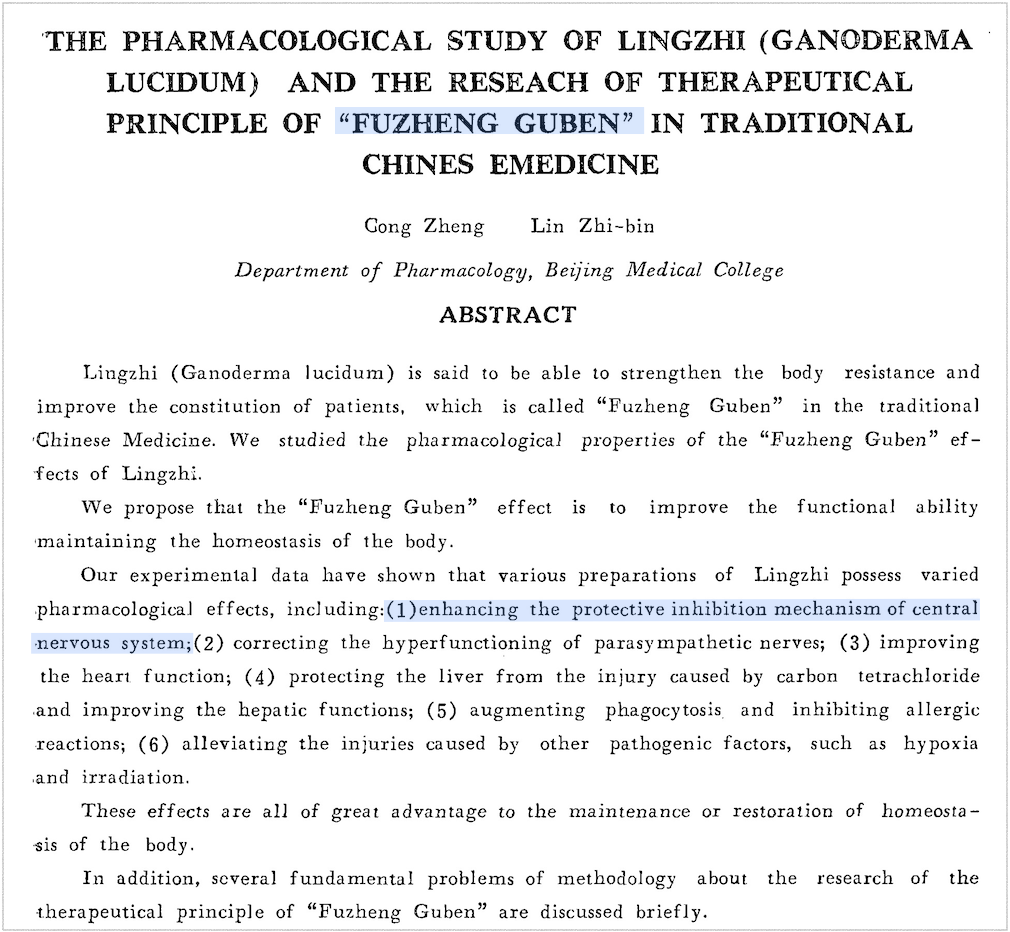
The Abstract of The Pharmacological Study of Lingzhi (Ganoderma Lucidum) And The Research Of Therapeutic Principle of “Fuzheng Guben” in Traditional Chinese Medicine
Ganoderma, through its dual regulatory effects on the nervous system and immunity, synchronously enhances both the "quality" and "quantity" of sleep.
Following the research by Professor Lin Zhibin et al., Professor Zhang Yonghe from the Department of Pharmacology at Peking University, who specializes in sleep and psychoneurotic drugs, further conducted a more in-depth analysis on how Ganoderma improves sleep by examining changes in electroencephalograms, blood parameters, and brain-related indicators in experimental animals. The findings were published in the "Pharmacology, Biochemistry and Behavior" journal in 2007 and the "Journal of Ethnopharmacology" in 2012.
This series of studies demonstrates that whether in drug-induced sleep conditions or spontaneous sleep rhythms according to their physiological clocks, the Ganoderma lucidum fruit body aqueous extract (GLE) can shorten the time to sleep onset, prolong sleep duration (primarily extending the light sleep period of non-rapid eye movement sleep), and increase sleep depth (by enhancing the intensity of delta waves during non-rapid eye movement sleep).
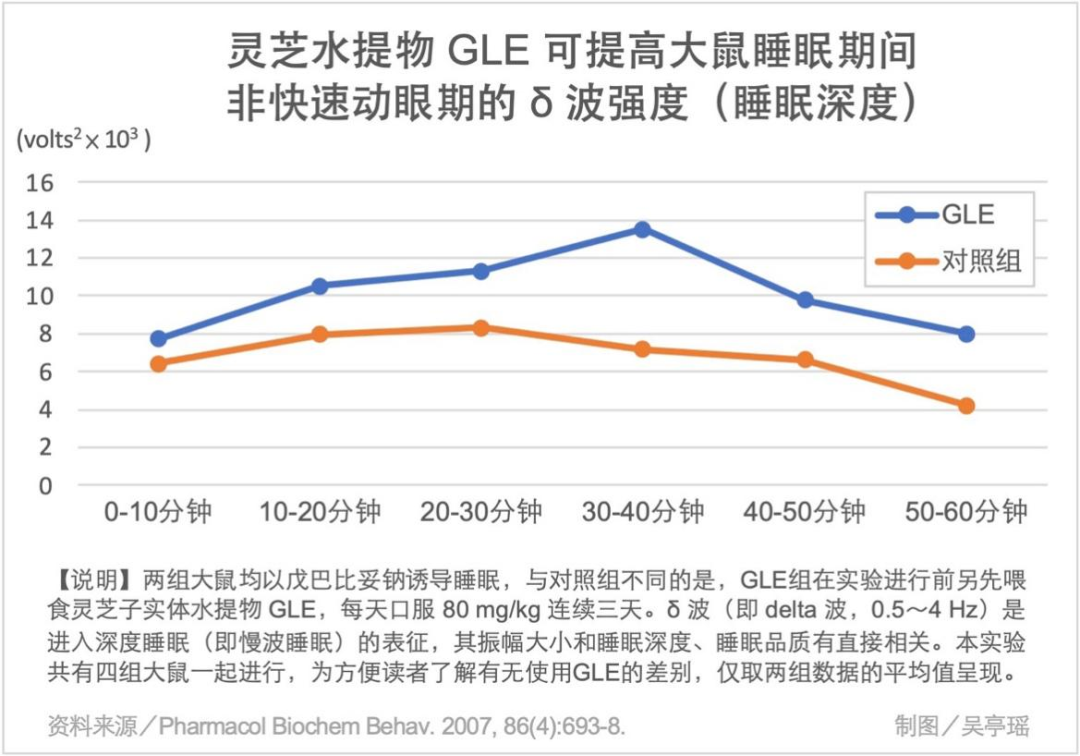
During the rapid eye movement (REM) stage of sleep, characterized by relaxed muscles yet heightened brain activity, the brain gradually transitions into an unconscious state during the non-rapid eye movement (NREM) phase. Heart rate, body temperature, and breathing all slow down progressively. When low-frequency delta (δ) waves appear in brain waves, it indicates the transition from the "falling asleep" and "light sleep" stages (NREM stages 1 and 2) to the deep sleep stage (also known as slow-wave sleep, NREM stage 3). The intensity of delta waves correlates positively with the depth (maturity) and quality of sleep.
The deep sleep phase serves as a crucial stage for the body to replenish energy, repair physiological functions, eliminate metabolic waste (such as amyloid), consolidate memory in the brain, regulate emotions, and enable the immune system to eradicate mutant cells and pathogens that intrude during the day. The effectiveness of these recuperative processes is positively correlated with the depth of sleep, which can be assessed through the amplitude intensity of delta (δ) waves.
Additionally, the transitional role of light sleep is also significant. On one hand, it aids in transitioning the body into deep sleep (hence, light sleep also serves some functions of deep sleep, albeit less prominently). On the other hand, it facilitates a gradual awakening of the body. Sufficient duration of light sleep contributes to the quality of deep sleep, post-sleep revitalization (as opposed to grogginess), and fosters a positive sleep experience.
Therefore, the Ganoderma lucidum fruit body aqueous extract (GLE) not only prolongs the duration of light sleep to increase total sleep length but also enhances the depth of sleep by augmenting the intensity of delta waves. This undoubtedly represents a tangible improvement in both the "quality" and "quantity" of sleep. In contrast, commonly used clinical benzodiazepines (BZD) sedative-hypnotic drugs (such as diazepam) may extend sleep duration but do not affect delta waves, highlighting differences in the mechanisms of action between Ganoderma and sedative-hypnotic drugs.
According to Professor Zhang Yonghe's research findings, orally ingested GLE acts similarly to sedative-hypnotic drugs by inhibiting neural activity through central nervous system GABA-A (gamma-aminobutyric acid type A) receptors, inducing calmness and sleep. However, the binding sites of these substances with the receptors differ. Furthermore, GLE also increases the concentration of TNF-α (tumor necrosis factor-alpha) in the blood and brain, which, along with prolonging non-rapid eye movement sleep, enhances the intensity of delta waves, indicating a distinct mechanism of action from sedative-hypnotic drugs.
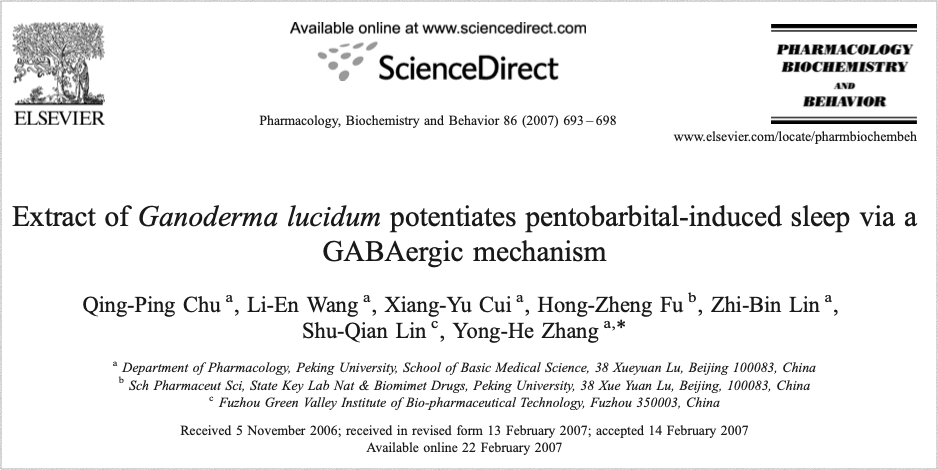
The research report that demonstrates the improvement of sleep through central nervous system GABA-A receptor modulation by Ganoderma lucidum water extract
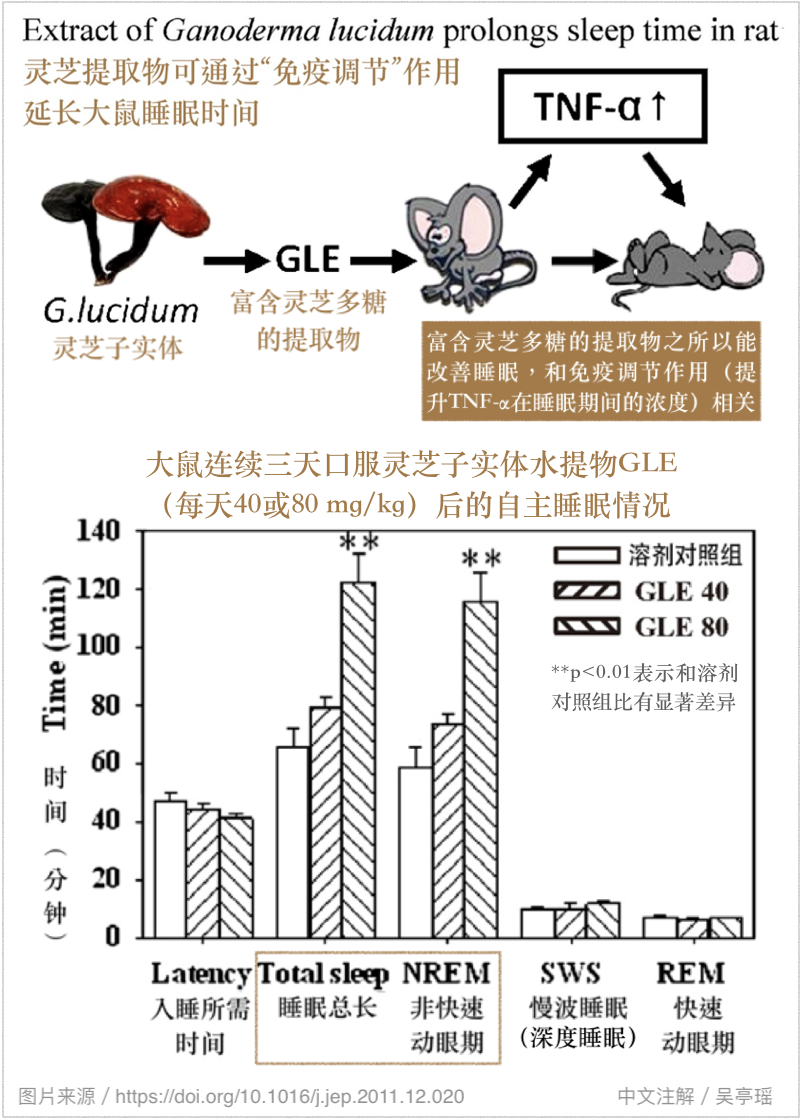
The research abstract that demonstrates the improvement of sleep through immunomodulatory effects of Ganoderma lucidum water extract
Sleep and immunity mutually influence each other, and Ganoderma can synchronously regulate both.
As an immune cytokine that inhibits virus replication and induces apoptosis in cancer cells, TNF-α has been proven to be positively correlated with circadian rhythms (aligning the biological clock with the day-night cycle), the duration of non-rapid eye movement sleep, and sleep depth (intensity of δ waves).
During the night, the concentration of cytokines released by immune cells activated by pathogens and other factors is higher than during the day, which triggers the sleep mechanism of the central nervous system. Subsequently, the non-rapid eye movement sleep stages of light sleep and deep sleep work together to create a favorable environment for the immune system, aiding in resistance against infections, combating tumors, and generating antibodies, while also supporting the formation of immune defenses and memory. Finally, as the immune response calms down, individuals gradually awaken.
In other words, "sleep" involves not only the nervous system but also the participation of the immune system (as well as the endocrine system). As long as it functions well, it can establish a beneficial cycle of "sleep homeostasis" and "immune homeostasis". Reishi, which can synchronously regulate both the nervous system and the immune system, evidently contributes to the propagation of this beneficial cycle.
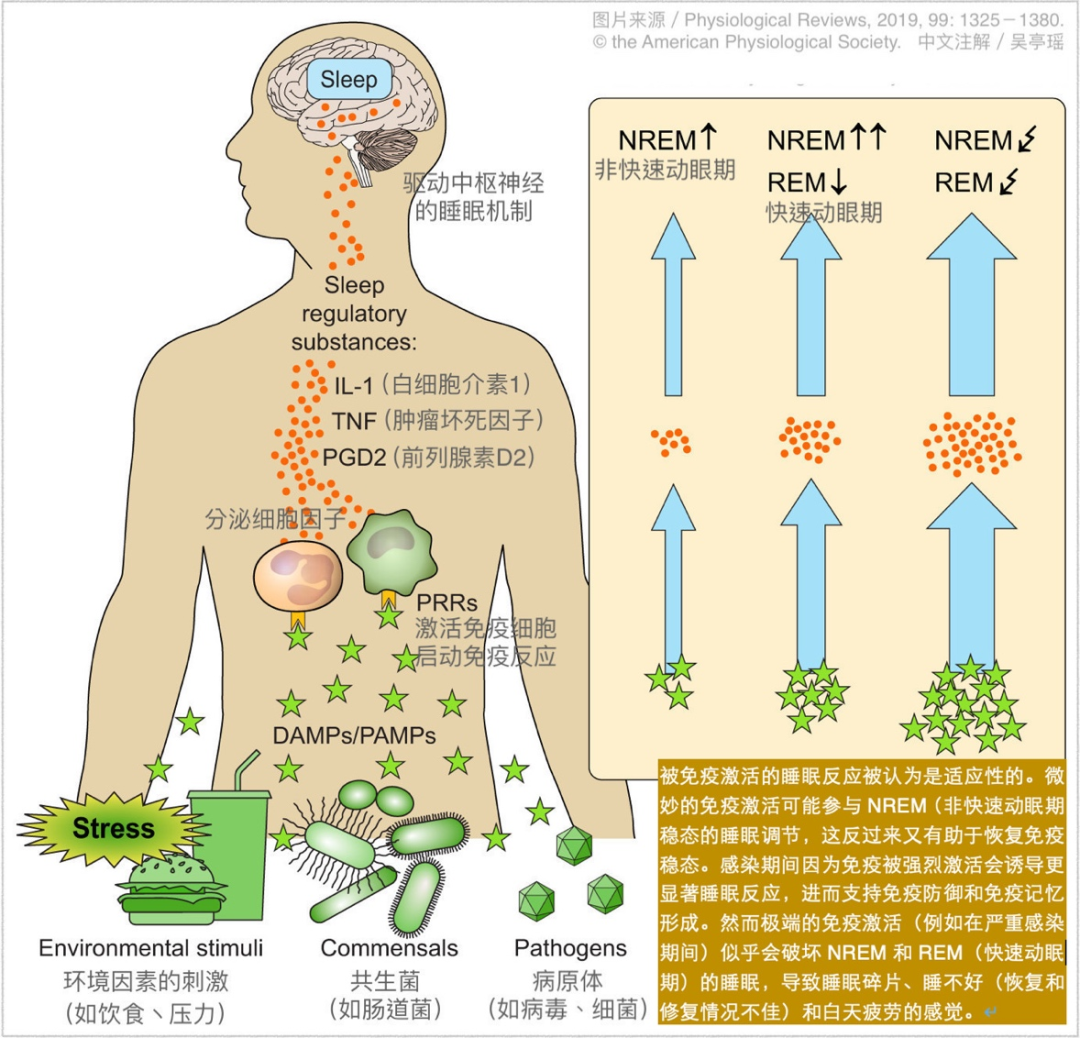
Health does not come swiftly; every night of good sleep is the cornerstone of health.
According to Professor Zhang Yonghe's research, experimental animals did not show an increase in TNF-α, an increase in total sleep time, an extension of non-rapid eye movement sleep, or enhancement of δ waves in the first two days of oral administration of Reishi. It was only after continuous oral administration for the third day that these specific responses beneficial to sleep and immunity appeared. This aligns with the results observed in early clinical trials of patients with neurasthenia, where symptoms such as insomnia typically took about two weeks to show improvement in human practice.
Furthermore, there is a positive correlation between the dosage and effects exhibited by experimental animals, but beyond a certain point, there is no additional benefit. This reminds us to adjust the dosage moderately based on individual physical conditions and self-perception, to find a balance between dosage and efficacy that suits ourselves.
Compared to the uplifting prospect of shrinking or eliminating tumors, or alleviating symptoms of neurodegenerative diseases such as Alzheimer's and Parkinson's, sleep, the cornerstone of reducing the incidence of tumors and neurodegeneration, appears mundane and easily overlooked.
But just as all wealth accumulates from a single dollar, health begins with every night's sleep. The key is not merely to sleep or to sleep at any time, but to follow the natural physiological clock (circadian rhythm) and to sleep with quality, so that one wakes up refreshed and energized, allowing the body to truly recover.
To conscientiously go to bed at the same time every night and to enhance sleep quality with Reishi mushroom is the lowest-cost and simplest way to maintain health. It is believed that through the gradual and imperceptible accumulation day by day, good immunity and brain health should be able to accompany us for a long time.

References:
1. Experimental study on the improvement of sleep in mice by compound Ganoderma preparations. Strait Pharmaceutical Journal, 2011, 23(5): 43-45.
2. The Pharmacological Study of Lingzhi (Ganoderma Lucidum) And The Research Of Therapeutic Principle of “Fuzheng Guben” in Traditional Chinese Medicine. Journal of Beijing Medical University, 1981, 13(1): 6-10.
3. Extract of Ganoderma lucidum potentiates pentobarbital-induced sleep via a GABAergic mechanism. Pharmacology, Biochemistry and Behavior, 2007, 86 (4): 693–698.
4. Extract of Ganoderma lucidum prolongs sleep time in rats. Journal of Ethnopharmacology, 2012, 139(3): 796–800.
5. The sleep-immune crosstalk in health and disease. Physiological Reviews, 2019, 99: 1325–1380.


Search
GanoHerb Group
Headquarters Address: Building 9, Phase 1, Innovation Park, Haixi Park, Fuzhou High-tech Zone, Fuzhou City, Fujian Province, China
Healthline:400-8899-773 Hotline:18105908051
COPYRIGHT © GanoHerb Group 闽ICP备05002116号-10 Powered by:300.cn

官方公众号

Wechat Mall

Tmall

Jingdong Mall


